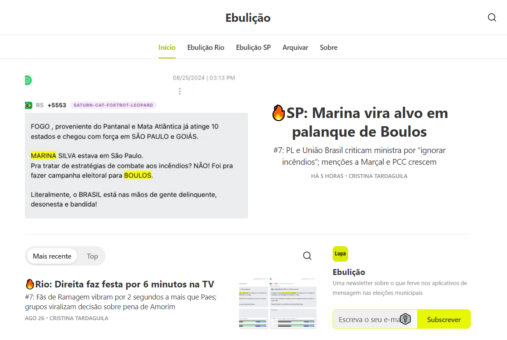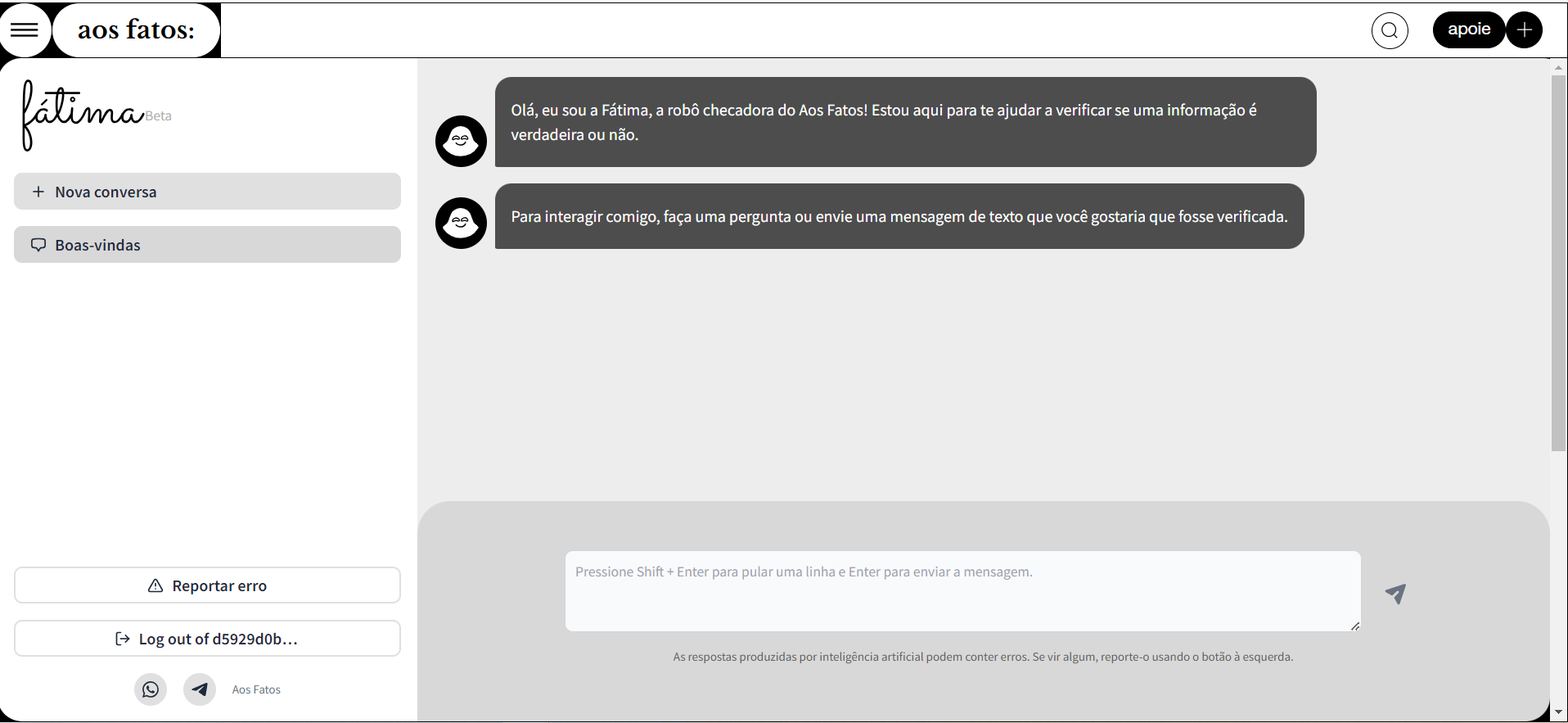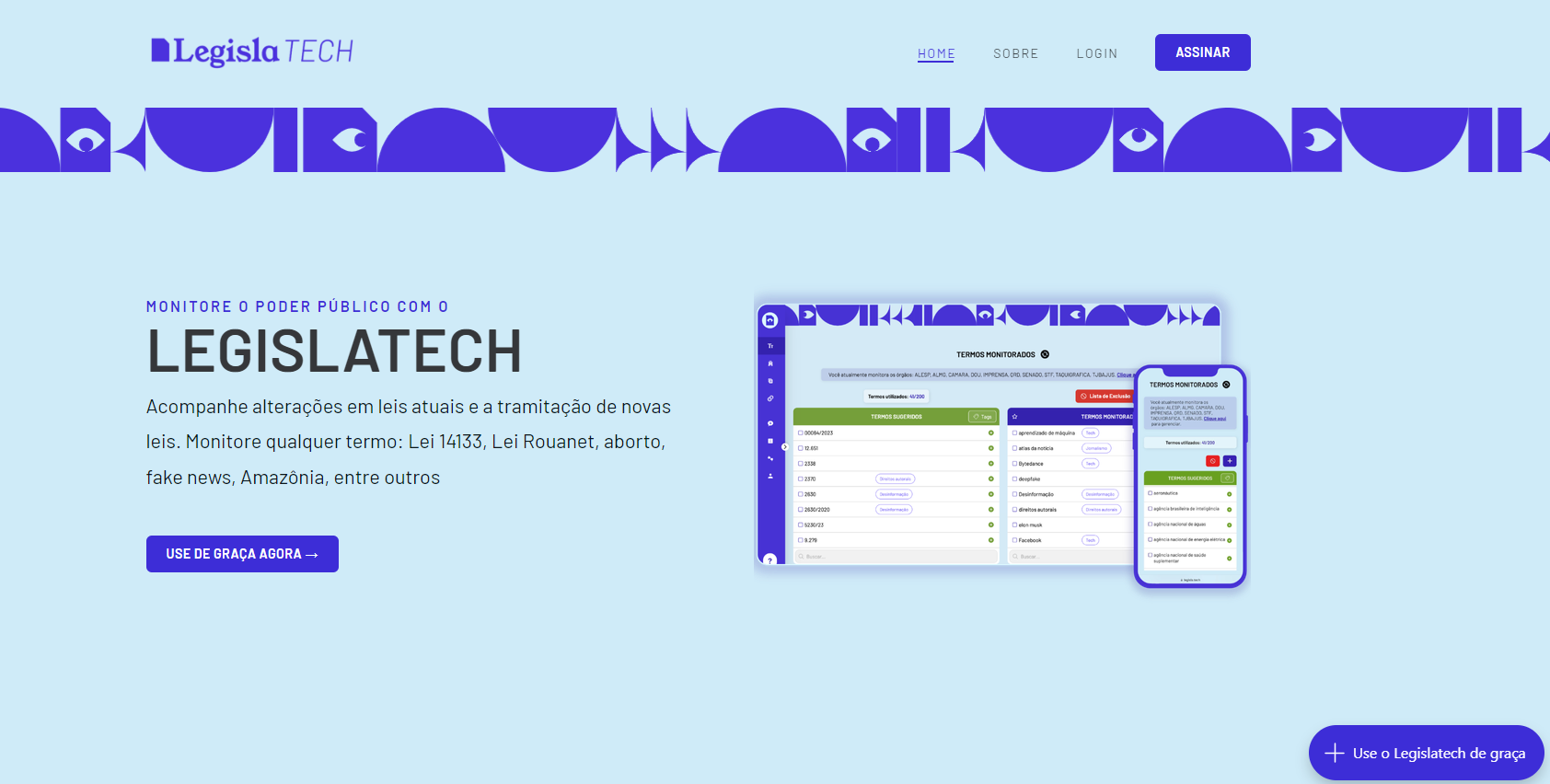Political campaigns for Oct. 6 municipal elections in Brazil have officially started, and new or renewed initiatives by independent media outlets in the country aim to make it easier for journalists and citizens to access elusive information.
A newsletter that monitors political content within often-times stealthy WhatsApp or Telegram groups, a chatbot that uses artificial intelligence (AI) to verify information within these spaces and a monitor that aggregates information on government legislation and regulations are among the new projects.
The projects outlined below help journalists and the public to find reliable information as voters in the country’s 5,570 municipalities head to the polls.
Whatsapp and Telegram can be like black boxes for the discussions that take place within the messaging platforms, but a new product sheds light on the activities in their public groups. Agência Lupa, known for its fact-checking work, launched the Ebulição (translated as “Boiling”) newsletter in August to monitor these traditionally inaccessible virtual spaces.
According to Cristina Tardáguila, founder and partner of Lupa, the origins of Ebulição date back to 2018, when Lupa began to have access to systems that allowed them to view activities of public groups on these messaging platforms. It was only recently, however, that the agency's team realized that this information could become journalistic content on a recurring basis.

Cover of the Ebulição newsletter by Agência Lupa, discussing the main debates and attacks in messaging apps during the municipal elections, focusing on criticism of Minister Marina Silva in São Paulo and the prominence of the right in Rio de Janeiro (Image: Screenshot of Ebulição Newsletter by Agência Lupa)
Cover of the Ebulição newsletter by Agência Lupa, discussing the main debates and attacks in messaging apps during the municipal elections, focusing on criticism of Minister Marina Silva in São Paulo and the prominence of the right in Rio de Janeiro (Image: Printscreen Ebulição)“We realized we had a gem of information, but we weren’t sharing that knowledge more broadly. Now, with Ebulição, we are able to shed light on this often inaccessible universe,” Tardáguila told LJR.
The newsletter uses technology from the Brazilian company Palver, which has been monitoring public WhatsApp groups since 2020. With this tool, it is possible to centralize information in a dashboard, search for specific terms, time periods and even segment the results by geographic location.
More than 80,000 groups are monitored with this tool. It's a number that’s constantly growing. There is a newsletter dedicated to Rio de Janeiro and another to São Paulo. Among the topics already covered, there is, for example, the repercussions of polls, how religious themes have appeared in campaigns and how proposed policies have taken a backseat during campaigns in São Paulo so far.
“We were able, for example, to track when certain content began to circulate in public groups and identify possible coordination in the dissemination of this information. This is gold for understanding how the encrypted universe is used to disperse content”, Tardáguila said.
Among Lupa's plans are adapting the newsletter for video and radio programs. Ebulição is not exclusively focused on the elections and will continue when the electoral cycle comes to an end. During this campaign period, however, its usefulness has been renewed.
"Our goal is for people interested in and involved with the election to know that there is a reliable way to follow what is happening in these groups," Tardáguila said.
Also dedicated to fact-checking, Aos Fatos is preparing to face the challenge of disinformation with two innovative tools that use AI: an update of the Fátima chatbot and the Busca Fatos platform.
Launched in 2019, Fátima performs instant fact-checks based on users’ questions. The launch of version 3.0 is scheduled for the first week of September, and incorporates LLM (Large Language Model) technology to interpret user questions and provide relevant answers in natural language.
Trained with the Aos Fatos database to answer questions about any topic the media outlet covers, the new chatbot update has been in testing since the end of last year. And according to Aos Fatos executive director Tai Nalon, it’s produced very promising results.
“It has presented almost negligible error rates, and the new technology has made the user experience much more reliable when asking questions using the chatbot,” Nalon told LJR.
Available for free on the Aos Fatos website, WhatsApp and Telegram, Fátima was designed to be an accessible tool even for those who do not have robust data plans, as it allows the user to obtain verified information without having to access external links.

Fátima, the chatbot by Aos Fatos, assists users in verifying the truthfulness of information through a straightforward and user-friendly interface (Image: Screenshot of Aos Fatos)
“The most efficient and safe way to communicate verified information and generate trust with the reader is to operate within platforms known to circulate disinformation,” Nalon said. “The fact that it is present on Whatsapp and Telegram offers usability gains, because users can access qualified information much more easily than if they had to pass through a link.”
The other tool is scheduled to launch at the end of September and is called Busca Fatos (Search for Facts).
It allows the user to upload video links. After automatically transcribing the audio, the tool uses AI to, based on checks carried out by Aos Fatos, to map topics that may be susceptible to disinformation. Finally, it suggests reliable sources where the user can check this information.
Unlike other tools, Busca Fatos does not directly suggest Aos Fatos fact-checks, but rather the best sources of information, promoting user autonomy in verifying the content. The central idea of Busca Fatos is to offer resources for the user to identify disinformation independently, not only during electoral periods, but also in other contexts.
“The tool does not verify, but rather identifies possible topics susceptible to disinformation. The idea is precisely to elevate the debate of ideas. We look for tools that give users autonomy, because they need verified information, quickly and at hand”, Nalon said.
Another innovation is Legislatech, a digital tool developed by Núcleo Jornalismo that monitors public documents, such as judicial proceedings, draft legislation and official gazettes, mainly from the legislative and executive branches.
"Legislatech serves to help the third sector and small companies carry out regulatory and legislative monitoring efficiently. Instead of checking 20 different websites, you access a single place and stay up to date with the latest news," Sérgio Spagnuolo, founder and executive director of Núcleo Jornalismo, told LJR.
Launched in beta mode in August 2023 and in the full version in March this year, the tool monitors 16 bodies, and has already identified 1,297 topics and tracked 517,796 documents.

Legislatech, a tool by Núcleo Jornalismo, enables users to monitor changes in laws and the progress of new legislative proposals, offering an accessible interface and free usage options (Image: Screenshot of Legislatech by Núcleo Jornalismo)
"Legislatech, a tool by Núcleo Jornalismo, enables users to monitor changes in laws and the progress of new legislative proposals, offering an accessible interface and free usage options (Image: Screenshot of Legislatech homepage)
Legislatech allows users to choose three parameters directly on the platform to personalize the experience: the specific terms they want to monitor in public documents, the agencies they want to monitor and the frequency with which they want to receive automated alerts.
The tool performs a scan every 30 minutes, collecting all documents that mention the selected keywords from the chosen government bodies. With this, Legislatech automates the generation of customized reports and triggers alerts for users.
Furthermore, Legislatech has a partnership with Querido Diário, a project that monitors the Official Gazettes of more than 400 Brazilian municipalities.
Legislatech offers different subscription plans, including a free option, which monitors the federal legislative chambers and up to two topics.
Paid plans, which start at R$25 (about US$4.50), offer access to more advanced automation and monitoring, serving both individuals and organizations.
To facilitate journalists' access to the platform, Spagnuolo said Núcleo is in talks with organizations to sponsor the membership of press professionals at no cost.
“There are companies that provide a similar service with much higher value,” he said.